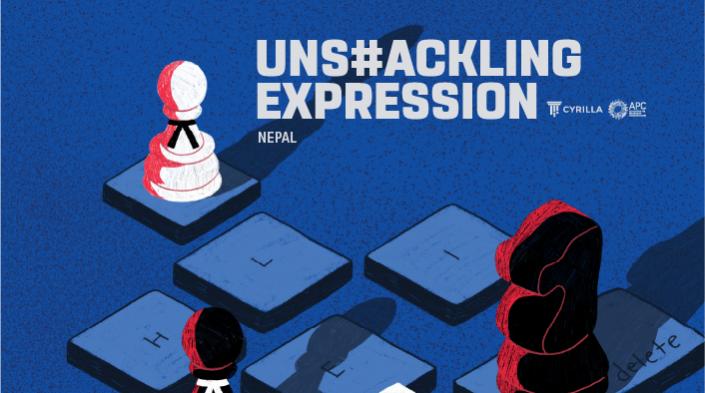
By APCNews
Published onPage last updated on
Does Nepal have a robust legal framework to promote and protect freedom of expression online? With internet users in the country growing in numbers, is the country prepared to ensure that its laws and policies encourage self-expression rather than stifle it? A new report, Unshackling Expression: A study on criminalisation of freedom of expression online in Nepal, attempts to explore these questions.
The report was developed by the Association for Progressive Communications (APC) in collaboration with APC member organisation Body & Data. Produced with the support of the CYRILLA Initiative, an online database of laws concerning digital rights, this report serves as a continuation of the 2017 publication Unshackling Expression: A study on laws criminalising expression online in Asia.
In Nepal, 96% of households own mobile phones and access the internet through a mobile network. The country also had 21 million broadband subscribers as of 2019. A 2020 study reported that in the last two years, YouTube usage in Nepal has grown by 60%. The rise of mobile internet users has given the Nepalese population another venue to express themselves and broadcast their opinions on various platforms. The online sphere in the country is rich with poems, memes, vlogs, status updates, photos and other means of self-expression. However, the country also faces challenges in regulating how people express themselves in the digital world, and while some laws and policies have been developed to protect the population against the harms of internet use, some laws are also being used to stifle freedom of expression and trample on people’s right to free speech.
The report provides insights on how these laws and policies are operationalised and implemented and if they are truly protecting the people’s interests. The authors also used court documents and cases to illustrate how certain laws and policies are applied to stifle freedom of expression and silence voices that are critical of those in power. The report assessed various laws in Nepal including the Penal Code, Criminal Code, Electronic Transaction Act and Individual Privacy Act of 2018, among others.
Based on the assessment, the report puts forward the following observations:
-
Terms that are used in most laws and policies are vague and broad. The lack of specificity falls below the international standards and provides a loophole for authorities to use the law to trample dissent and criticism of the state.
-
The legal framework of Nepal considers all sexual content as immoral and obscene. The law has no space to recognise consent and does not seem to acknowledge an individual’s agency, autonomy and freedom over their own bodies and self-expression. This lack of understanding of consent had led to the criminalisation of sexual expression.
-
The country has no framework for data protection laws. Many business entities capture and store personal information of the general public. This information, which often includes phone numbers and other sensitive data, is used for marketing purposes.
-
The laws have no provisions that allow citizens to challenge state-mandated internet shutdowns.
Beyond laws and policies, Nepal has to counter other factors to truly promote its citizens’ right to free speech and freedom of expression. Marginalised communities are often subject to gender-based violence, discrimination and bullying that carry over from the offline to the online sphere. Therefore, Nepal has to address these issues and adopt a more rights-based approach to ensure that everyone is encouraged to speak up and express themselves.
Access the full report here.


